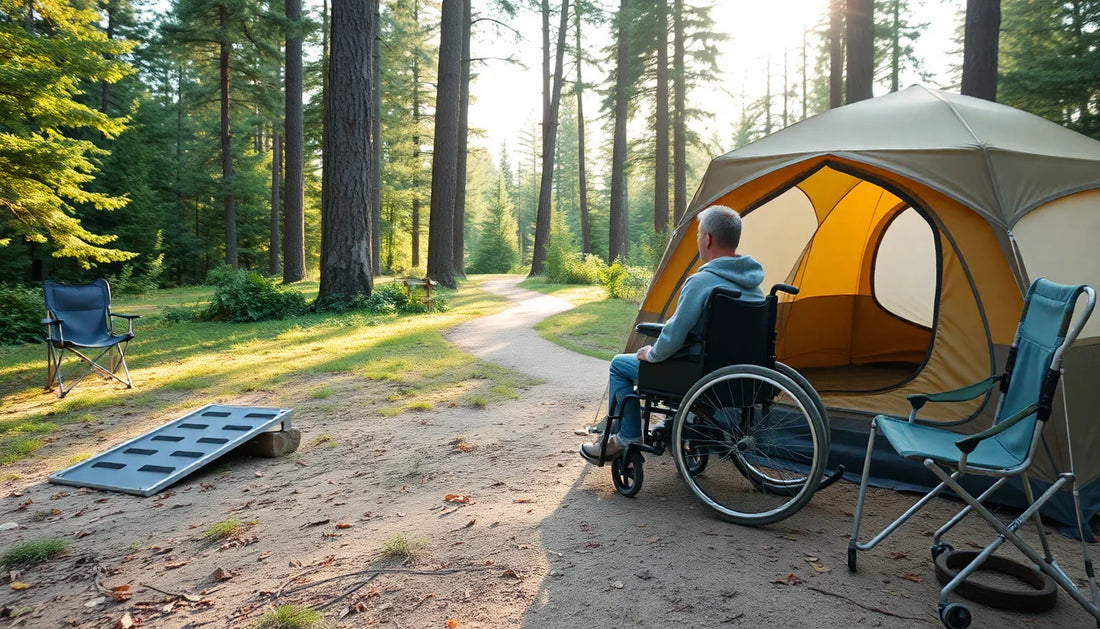
Camping with Limited Mobility: Accessibility Tips and Gear
Share
Outdoor adventures have the power to rejuvenate the mind, body, and spirit. However, for individuals with limited mobility, the prospect of camping can seem daunting and inaccessible. But with the right mindset, preparation, and adaptive equipment, the great outdoors can be just as welcoming and empowering for those with physical disabilities or mobility challenges.
At GlowCamp, we believe that everyone deserves the opportunity to immerse themselves in nature and experience the transformative benefits of camping. That's why we've curated a collection of functional, mobility-friendly gear designed to make the outdoors feel like home, no matter your physical abilities.
Planning Your Camping Trip
The first step in planning an accessible camping adventure is researching wheelchair-friendly campgrounds and national parks. Many public lands and private campsites now offer designated accessible sites, complete with level terrain, paved pathways, and nearby amenities. Websites like Accessible Camping and the National Park Service's Accessibility Guide can help you identify the perfect destination.
Once you've selected your campsite, it's time to start planning the logistics. Create a detailed checklist to ensure you've packed all the necessary adaptive equipment, from mobility aids and assistive technology to specialized camping gear. Don't forget to factor in any medical supplies or personal care items you may need during your stay.
Essential Adaptive Camping Gear
Navigating the outdoors with limited mobility requires specialized equipment designed to provide comfort, stability, and independence. At GlowCamp, we offer a curated selection of adaptive camping gear to make your outdoor adventure as seamless as possible.
Consider investing in a sturdy, all-terrain wheelchair or mobility scooter to tackle uneven terrain. Lightweight, collapsible models are perfect for easy transport and setup. Pair your mobility aid with a durable, accessible tent that can accommodate your wheelchair or walker, and look for sleeping bags and pads designed for optimal comfort and support.
Other essential adaptive gear includes portable ramps, transfer boards, and grab bars to assist with entering and exiting your tent, as well as specialized cooking equipment and utensils to make meal preparation a breeze.
Campsite Setup Strategies
Once you've arrived at your campsite, it's time to put your planning into action. Carefully navigate the terrain, looking for the most level and accessible areas to set up your tent and other gear. Utilize mobility aids and assistive technology to ensure your campsite is tailored to your specific needs.
Inside your tent, create a comfortable and organized sleeping area. Invest in a raised cot or air mattress to make getting in and out easier, and arrange your personal items within easy reach. Don't forget to pack a portable ramp or step stool to help you transition from your wheelchair or walker to your sleeping setup.
Safety and Comfort Considerations
Camping with limited mobility requires extra attention to safety and personal care. Be sure to pack any necessary medical supplies, medications, and emergency contact information. Research local emergency services and hospitals in the area, and have a plan in place for addressing any health concerns that may arise during your trip.
Comfort is also key to a successful camping adventure. Bring adaptive clothing and personal care items that cater to your specific needs, such as moisture-wicking fabrics, easy-to-use fasteners, and specialized hygiene products. Don't forget to pack sun protection, insect repellent, and other essentials to keep you safe and comfortable in the great outdoors.
Inclusive Outdoor Activities
Camping is about more than just setting up your tent and cooking meals. Embrace the opportunity to explore the natural world through a variety of accessible outdoor activities. Look for modified hiking trails, adaptive recreation equipment, and guided tours that cater to individuals with limited mobility.
With the right preparation and support, you can enjoy everything from nature walks and birdwatching to adaptive fishing and campfire storytelling. Engage with your fellow campers, build a sense of community, and celebrate your independence and resilience in the great outdoors.
Mental and Emotional Benefits
Stepping out of your comfort zone and embracing the challenges of camping with limited mobility can be a truly transformative experience. Not only does it provide physical benefits, but it can also have a profound impact on your mental and emotional well-being.
Overcoming outdoor adventure barriers can boost your confidence, foster a deeper connection with nature, and instill a renewed sense of independence and empowerment. Immersing yourself in the tranquility of the great outdoors can also have a calming effect, reducing stress and anxiety and promoting overall well-being.
Conclusion
Camping with limited mobility may require extra planning and preparation, but the rewards are well worth the effort. By embracing adaptive gear, accessible campsite strategies, and inclusive outdoor activities, you can unlock a world of adventure and self-discovery.
At GlowCamp, we're committed to making the great outdoors accessible to everyone. Explore our collection of mobility-friendly camping equipment, and let us help you plan your next accessible camping adventure. Together, we can break down the barriers and celebrate the transformative power of the great outdoors.
